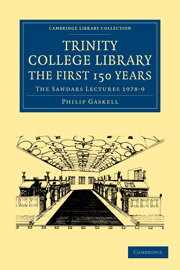Book contents
- Frontmatter
- Contents
- Lists of illustrations and plans
- Preface
- Terms and conventions
- Abbreviations
- 1546–1600
- 1601–1695
- 9 The New Library
- 10 Stanhope's Librarianship
- 11 Collections of manuscripts
- 12 The growth of the working collections, 1601–40
- 13 The arrangement of the books, 1601–40
- 14 Administration and reorganisation, 1641–74
- 15 The book stock, 1667–95
- 16 The last years of the New Library
- APPENDIXES
- Index
14 - Administration and reorganisation, 1641–74
Published online by Cambridge University Press: 05 August 2011
- Frontmatter
- Contents
- Lists of illustrations and plans
- Preface
- Terms and conventions
- Abbreviations
- 1546–1600
- 1601–1695
- 9 The New Library
- 10 Stanhope's Librarianship
- 11 Collections of manuscripts
- 12 The growth of the working collections, 1601–40
- 13 The arrangement of the books, 1601–40
- 14 Administration and reorganisation, 1641–74
- 15 The book stock, 1667–95
- 16 The last years of the New Library
- APPENDIXES
- Index
Summary
Substantial changes in the organisation of the College Library took place during the Librarianship of Thomas Griffith, 1641–74. Griffith (or Mutton, as he was probably called when he matriculated in 1633) was elected Librarian at an especially troubled time in the history of the College. By 1645 the Master (Comber) and forty-seven Fellows of Trinity had been ejected on account of their royalist activities or for refusing the Covenant, and only one of the governing body of eight Seniors remained in office. Not surprisingly Griffith, who appears to have been a royalist, came close to losing the Librarianship. Perhaps he thought it prudent to withdraw from Cambridge while the troubles were at their height, for in the winter of 1645 the key of the Library was held, not by the Librarian, but successively by Thomas Archer MA and John Davies BA. Then the following summer it was agreed by the new Master (Hill) and Seniors that ‘Mr Griffith be wholy remooved from ye Library keepers place for: his long neglect thereof: etc.’; and a fortnight later it was further agreed that Thomas Holloway BA ‘should be elected into ye Library keepers place’.
All ended well for Griffith, however. Holloway the substitute received the Librarian's stipend for the year 1646 only, after which Griffith was reinstated, the orders which had deprived him and appointed Holloway being erased from the Conclusion book.
- Type
- Chapter
- Information
- Trinity College Library. The First 150 YearsThe Sandars Lectures 1978–9, pp. 107 - 125Publisher: Cambridge University PressPrint publication year: 2010First published in: 1980



